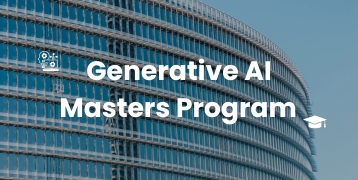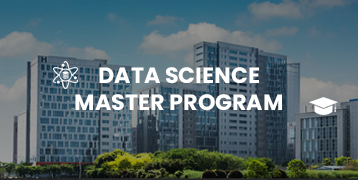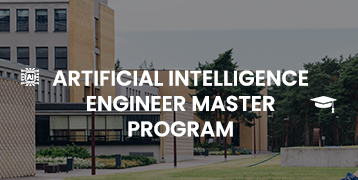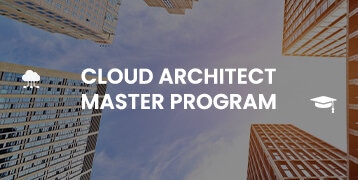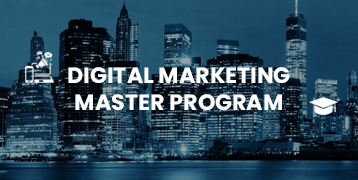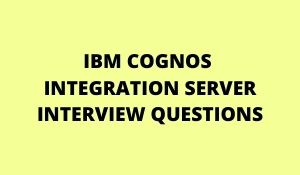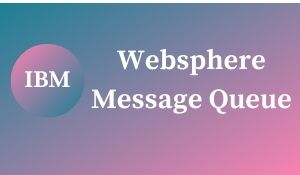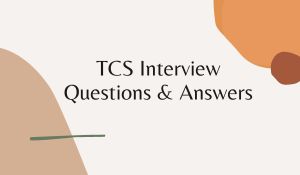
TCS (Tata Consultancy Services) is a global information technology consulting, services, and business solutions organization headquartered in Mumbai, India. It is a part of the Tata Group, one of India’s largest business conglomerates. TCS is one of the largest IT services companies in the world, with a presence in over 46 countries and providing services to clients in various industries including banking, finance, healthcare, retail, and more. TCS offers a range of services such as application development and maintenance, infrastructure management, business process outsourcing, and more. The company was founded in 1968 and has since grown to become one of the most recognized and respected brands in the global IT industry.
TCS Interview Process
TCS interview process may vary depending on the position you are applying for, but generally, it consists of the following steps:
1. Online Test: TCS may conduct an online test to assess your skills and knowledge in the relevant field. The test may include questions on technical skills, logical reasoning, and English language proficiency.
2. Technical Interview: If you pass the online test, you will be called for a technical interview, where a panel of experts will assess your technical knowledge and skills. They may ask you questions related to your field of expertise, previous work experience, and projects you have worked on.
3. HR Interview: After the technical interview, you may be called for an HR interview, where the interviewer will evaluate your communication skills, personality, and cultural fit with the organization. They may also ask questions related to your career goals, strengths, weaknesses, and interests.
4. Background Verification: If you successfully clear the interview rounds, TCS may conduct a background verification to ensure that the information you provided in your application is accurate and valid.
5. Offer Letter: If you clear the background verification, TCS will issue an offer letter with details of your job role, salary, benefits, and other terms and conditions.
It’s important to note that the interview process may differ depending on the position you are applying for and the location where you are applying. It’s always a good idea to research the company and the position you are applying for before the interview to prepare yourself.
TCS HR Interview Question and answer
1. Tell me about yourself?
My name is [Your Name], and I have recently completed my graduation in [Your Field of Study]. I have a keen interest in [Your Area of Interest], and I have been working on various projects related to it. I have good communication skills and can work well in a team environment.
2. What are your strengths and weaknesses?
My strengths are my ability to work under pressure, attention to detail, and problem-solving skills. My weakness is that I tend to take on too much work and have difficulty delegating tasks to others. However, I am working on improving my delegation skills.
3. What do you know about TCS?
TCS is a global IT consulting and services company headquartered in Mumbai, India. It is a part of the Tata Group, one of India’s largest business conglomerates. TCS provides services to clients in various industries, including banking, finance, healthcare, and retail. It has a presence in over 46 countries and is one of the largest IT services companies in the world.
4 .What are your technical skills?
I have expertise in [Your Technical Skills], and I have worked on various projects related to it. I am also familiar with [Other Relevant Technical Skills] and have some experience working with them.
5. How do you handle conflicts in a team environment?
I believe that communication is key to resolving conflicts in a team environment. I try to listen to everyone’s perspective and understand their concerns. Then, I work with the team to find a mutually acceptable solution. If necessary, I involve a third-party mediator to resolve the conflict.
6. What motivates you to work for TCS?
TCS is a respected organization with a global presence and a track record of providing quality services to its clients. I am motivated to work for TCS because of the opportunity to work with a team of talented professionals and contribute to the success of the organization. I am also excited about the opportunity to learn new skills and grow professionally.
TCS Specialized Interview Question and answer for Fresher
1 .what is your specialized chops?
As a fresher, I’ve learned the fundamentals of programming languages similar as C, Java, and Python. I’ve also gained knowledge of databases, operating systems, and computer networks.
2. Can you explain the difference between procedural and object- acquainted programming?
Procedural programming is a programming paradigm that focuses on writing procedures or functions that perform specific tasks. Object- acquainted programming, on the other hand, is a programming paradigm that uses objects to represent real- world realities and combines data and geste in a single unit.
3. Can you explain the conception of data structures and their types?
A data structure is a way of organizing and storing data in a computer so that it can be penetrated and used efficiently. There are colorful types of data structures, similar as arrays, linked lists, heaps, ranges, trees, and graphs. Each type of data structure has its own advantages and disadvantages, and the choice of data structure depends on the specific use case.
4. What are the differences between Python 2 and Python 3?
Python 3 is the rearmost interpretation of Python, while Python 2 is an aged interpretation that’s no longer supported. Python 3 has several differences compared to Python 2, similar as bettered Unicode support, print statements being replaced with print functions, and changes to division and integer types.
5. What’s vim 8 and why is it important?
Vim 8 is a style companion for Python law that defines the coding norms and conventions to be followed when writing Python law. Following vim 8 helps in writing readable and justifiable law that’s harmonious with other Python law.
6. What are decorators in Python, and how are they used?
Decorators in Python are a way to modify the geste of a function or class without changing its law. They’re defined using the”@” symbol followed by the name of the decorator function. Decorators are generally used to apply hiding, logging, and other cross-cutting enterprises.
7. How does heritage work in Python?
Heritage is a way to define a new class grounded on an being class. The new class inherits the attributes and styles of the being class and can add its own attributes and styles. In Python, heritage is enforced using the” class” keyword and the name of the base class in hiatuses.
8. What’s Java?
Java is a programming language that’s used to develop colorful operations, including desktop and mobile operations, web operations, and enterprise operations. It’s a high- position, object- acquainted language that’s designed to be platform-independent and secure.
9. What’s the difference between an interface and an abstract class in Java?
An interface is a collection of system autographs that a class can apply. It’s used to define a contract that a class must cleave to. An abstract class is a class that cannot be expressed and can contain both system delineations and system executions. Abstract classes are used to define a base class for other classes to extend.
10. What’s the difference between a class and an object in Java?
A class is a design or template for creating objects, while an object is an case of a class. A class defines the attributes and styles that an object can have, while an object is a specific case of a class that has its own values for the attributes.

11. What’s the difference between the” ==“driver and the”. Equals ()” system in Java?
The” ==“driver checks whether two objects are the same case, while the”. Equals ()” system checks whether two objects have the same value. The” ==“driver compares the memory address of the objects, while the”. Equals ()” system compares the contents of the objects.
12. What’s the difference between a mound and a line in Java?
A mound is a collection of rudiments that follows the Last- In-First- eschewal (LIFO) principle, meaning that the last element added to the mound is the first element to be removed. A line is a collection of rudiments that follows the First- In- First- Out (FIFO) principle, meaning that the first element added to the line is the first element to be removed.
13. What’s the difference between C and C?
C is a procedural programming language, while C is an object- acquainted programming language. In C, functions are used to break down a program into lower corridor, while in C, objects and classes are used to represent data and styles. C also supports polymorphism, heritage, and encapsulation, while C does not. Also, C supports function overloading and driver overloading, which aren’t available in C.
14. What’s a constructor in C?
A constructor is a special member function in a class that’s used to initialize the objects of that class. It’s called automatically when an object of the class is created. The constructor has the same name as the class, and it can take arguments or be parameter less. There are two types of constructors in C dereliction constructors and parameterized constructors. A dereliction constructor is a constructor that’s called automatically when an object is created without any arguments. A parameterized constructor is a constructor that takes one or further arguments and is used to initialize the object with specific values. Constructors can also be overfilled like other functions, allowing for multiple ways to initialize an object.
15. What’s Encapsulation?
Encapsulation is a abecedarian conception in object- acquainted programming that refers to the practice of binding data and geste together within a single unit called a class. Encapsulation enables the class to control the access to its data members, and to expose them only through well- defined styles, while hiding the internal perpetration details from the outside world.
16. What’s Variable?
Variables are used to store and manipulate data within a program, allowing the program to store and recoup information as demanded during its prosecution. Variables can hold numerous different types of values, including figures, textbook, Boolean values, and more complex data structures similar as arrays or objects. The value of a variable can be changed during the prosecution of a program, allowing it to be used to represent changing values or to perform computations grounded on input or other data.
17. What are the types of circles in java?
In Java, there are three types of circles for circle A for circle is used to execute a block of law constantly grounded on a set number of duplications. The circle consists of an initialization statement, a condition, and a proliferation or diminishment statement. A while circle is used to execute a block of law constantly as long as a given condition is true. The condition is estimated before the circle body is executed. 3. Do- while circle a do- while circle is used to execute a block of law constantly as long as a given condition is true. The condition is estimated after the circle body is executed, which means that the circle body will always execute at least formerly.
18. What’s polymorphism and how is it enforced in Java?
Polymorphism is the capability of an object to take on numerous forms. In Java, polymorphism is enforced through system overloading and system booting. System overloading is the capability to define multiple styles with the same name in a class, but with different parameters. System booting is the capability to define a system in a class with the same hand as a system in the super class, therefore replacing the original system.
19. What’s a static system and how is it different from an case system?
A static system is a system that’s associated with a class, rather than with a case of the class. It can be called using the class name, without creating an object of the class. A case system, on the other hand, is a system that’s associated with an case of the class, and can be called only on an object of the class. Stationary styles can pierce only stationary members of the class, while case styles can pierce both static andnon-static members.
20. What’s the difference between a compiler and an practitioner?
A compiler is a program that translates source law written in a high- position programming language into machine law that can be executed directly by a computer. The affair of a compiler is generally an executable train that can be run on the computer. An practitioner, on the other hand, is a program that reads and executes source law directly, without first rephrasing it into machine law. Interpreted law is executed line- by- line, and crimes are frequently detected at runtime rather than at collect time.
21. Explain the difference between an inner class and a nested class in Java?
In Java, an inner class is a class that is defined within another class and has access to its enclosing class’s members. A nested class, on the other hand, is a class that is defined within another class but does not have access to its enclosing class’s members. Inner classes are typically used to implement helper classes or listeners, while nested classes are typically used to encapsulate related functionality.
22. What is a linked list and how is it implemented in Java?
A linked list is a data structure that consists of a sequence of nodes, each of which contains a reference to an object and a reference to the next node in the list. It can be used to implement a variety of data structures, such as stacks and queues. In Java, a linked list is typically implemented using a nested class to represent the nodes and a reference to the first node in the list.
23. What is a constructor and how does it differ from a method?
A constructor is a special method that is used to initialize objects when they are created. It has the same name as the class and no return type. A method, on the other hand, is a block of code that can be called by an object to perform a specific task. Methods can have any name and can return a value.
24. What is the purpose of the “final” keyword in Java?
The “final” keyword in Java is used to denote that a variable, method, or class cannot be changed or extended.
When applied to a variable, the “final” keyword indicates that the variable’s value cannot be changed after it has been initialized. This can help prevent errors caused by accidental modification of a variable’s value.
When applied to a method, the “final” keyword indicates that the method cannot be overridden by subclasses. This can be useful in situations where a method’s implementation should not be changed by subclasses.
When applied to a class, the “final” keyword indicates that the class cannot be extended by subclasses. This can be useful in situations where a class’s behavior should not be modified or extended by other classes.

Conclusion
TCS technical interviews for freshers typically cover a range of topics related to computer science and programming, such as object-oriented programming, data structures, algorithms, and software development concepts. Candidates should be prepared to answer both theoretical questions and practical coding problems. It’s important to have a good understanding of the fundamentals and be able to explain your thought process and reasoning behind your solutions. Good communication skills, a positive attitude, and a willingness to learn and adapt are also important qualities that can help candidates succeed in TCS technical interviews.

